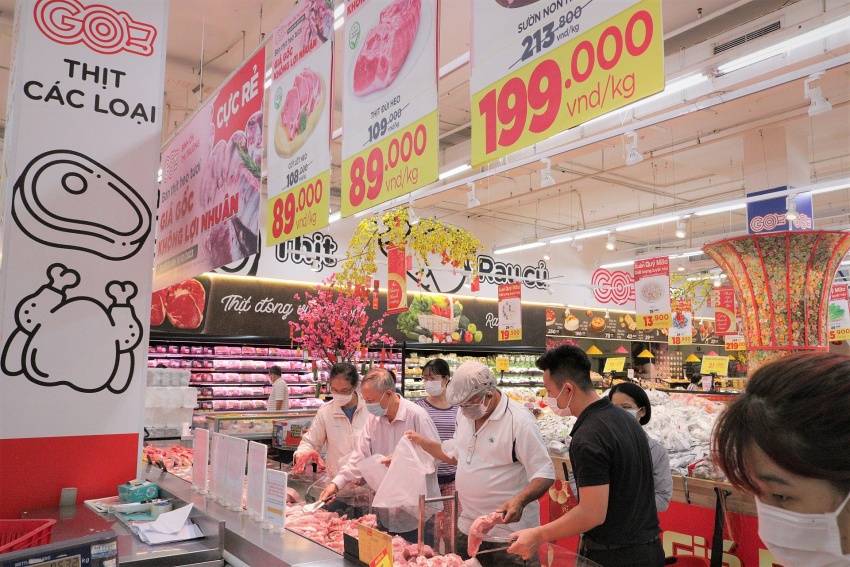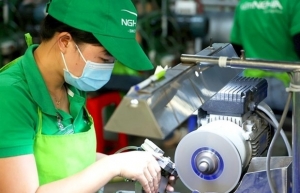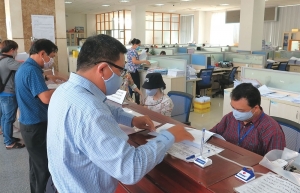2 per cent reduction in VAT to boost aggregate demand
 |
| 2 per cent VAT reduction to boost aggregate demand |
Last week, Deputy Prime Minister Le Minh Khai approved a proposal to reduce VAT from 10 to 8 per cent for all types of goods, as proposed by the Ministry of Finance (MoF). After the proposal is passed by the government, the MoF will be required to urgently draft a resolution to be submitted to the National Assembly for consideration and approval through an expedited process.
Talking to the media, Tran Tho Dat, chairman of the Council for Science and Education at the National Economics University, said that the economy is facing many obstacles, as evidenced by the GDP growth rate of just over 3 per cent in the first quarter and the apparent difficulties faced by businesses.
“The 2 per cent reduction in VAT will have a significant impact on overall demand, with consumers able to pay less and businesses able to benefit from lower input costs. The reduced VAT will have an impact on both overall demand and total revenue,” said Dat.
The economist added that this is a reasonable policy that needs to be maintained, especially in the current economic context.
In the same view, Nguyen Thi Cuc, chairwoman of the Vietnam Tax Consultants' Association, said that at this time, the policy of reducing VAT is necessary for businesses and society as a whole because in the first quarter of 2023, business are struggling, and more enterprises are going bankrupt.
“Continuing to reduce VAT will create conditions for businesses to resume production by reducing the price of goods and services, allowing them to sell more,” Cuc assessed.
"For manufacturing businesses that use input materials, the reduced tax in this area will help them reduce costs and stimulate production," she added.
Furthermore, Cuc believes that the VAT reduction in 2023 will be shorter than in previous pandemic years, so it is necessary to apply the 2 per cent reduction to all goods and services that are currently subject to 10 per cent VAT, rather than to only some of them as before.
"If the policy is extended as in 2022, with a VAT reduction for some goods and the exclusion of others, it will just be a torture for businesses. We support the proposal to reduce VAT for all goods and services," she concluded.
Director of ANVI Law Firm Truong Thanh Duc agreed, assessing that the current reduction of VAT for all goods and services shows a lesson learned by the MoF.
“In previous years, businesses were able to reduce VAT, but the bookkeeping was very difficult because some items were reduced to 8 per cent while others were not.”
Duc then continued to suggest that the current reduction might not even be enough.
"In my opinion, VAT should be reduced to 5 per cent. In addition to many goods that are subject to 10 per cent VAT, there are still some items that are liable for 5 per cent VAT and others that are not subject to tax at all. Therefore, it still causes a problem for businesses to categorise them," he added.
"The real estate market is currently frozen, bonds and stocks have fallen to exhaustion, exporters losing orders, and businesses are facing hundreds of other obstacles, so quick policies are needed that create better conditions for them," Duc continued.
From a manufacturer viewpoint, some enterprises said that although the 2 per cent VAT reduction in 2022 reduced purchasing costs for consumers, it did not promote purchasing power much. The core value of this policy is to show the care and companionship of the state with the people and businesses.
Lu Nguyen Xuan Vu, chairman of Xuan Nguyen Group JSC, reflected that the current purchasing power is too weak. Most businesses apply promotions, reduce prices, or even sell at or less than cost to push sales, while the government has reduced taxes and extended and restructured debts to try to improve the situation.
"However, these are all short-term solutions. Businesses do not have enough orders, lack capital, and their products cannot be sold. They have to cut labour, leading to people cutting spending. Therefore, we need practical solutions from the state to enable businesses to resume operations, banks to disburse loans, and obstacles related to land procedures to be removed," urged Vu.
According to the MoF, if the National Assembly approves the 2 per cent VAT reduction (expected to be approved in June), budget revenue in the second half of the year may decrease by VND35 trillion ($1.5 billion), but the upside could be much greater. This is because VAT can be reduced in the absolute amount, but reducing VAT will increase the collection of other taxes, such as corporate and personal income tax, and lead to increased consumption.
In the view of Nguyen Van Phung, former director of the Large Taxpayers Department under the General Department of Taxation, reducing VAT from 10 to 8 per cent for all taxable items is the right thing to do, but the process needs to be shortened with specific guidelines.
“The more detailed and more extensive the tax conditions are, the more benefit businesses can gain. However, they must still be simple enough to manage,” said Phung.
According to the proposal by the MoF, the VAT rate will be reduced by 2 per cent in 2023 for all goods and services subject to the 10 per cent tax rate. At the same time, the percentage rate used to calculate VAT for businesses (including household and individual businesses) will be reduced by 20 per cent when issuing invoices for all goods and services subject to the 10 per cent VAT.
The reduced VAT rate for each type of goods and services specified in this provision will be applied uniformly at all stages of import, production, processing, and distribution. The policy will be effective from the date of issuance until December 31, 2023.
Previously in 2022, with the aim of stimulating the economy, the National Assembly issued Resolution No.43/2022/QH15 on fiscal and monetary policies to support the Economic-Social Recovery and Development Programme. The government then issued Decree No.15/2022/ND-CP, regulating tax exemption and reduction policies according to Resolution No.43/2022/QH15 from the National Assembly. The results have shown that the total VAT reduction support package in 2022 reached around VND44 trillion ($1.9 billion).
 | Vietnam to amend law on personal income tax It is pressing for Vietnam to amend the Law on Personal Income Tax (PIT) as many of its regulations have proven outdated and no longer appropriate. |
 | Alcohol, tobacco and soft drinks face increase in excise tax Alcohol, tobacco and soft drinks will be subject to an increased excise tax aiming to improve community health and tackle the national budget deficit as part of a comprehensive tax reform strategy for 2030. |
 | Vendors forced out with tax tightening Tightening tax collection rules in regards to online sellers will likely force out amateur vendors that cut corners to make quick money via e-commerce. |
 | Tax refund stand-off comes to a head A range of business associations in Vietnam have addressed their concerns over current tax refund procedures. |
What the stars mean:
★ Poor ★ ★ Promising ★★★ Good ★★★★ Very good ★★★★★ Exceptional
Related Contents
Latest News
More News
- Masan Consumer names new deputy CEO to drive foods and beverages growth (February 23, 2026 | 20:52)
- Myriad risks ahead, but ones Vietnam can confront (February 20, 2026 | 15:02)
- Vietnam making the leap into AI and semiconductors (February 20, 2026 | 09:37)
- Funding must be activated for semiconductor success (February 20, 2026 | 09:20)
- Resilience as new benchmark for smarter infrastructure (February 19, 2026 | 20:35)
- A golden time to shine within ASEAN (February 19, 2026 | 20:22)
- Vietnam’s pivotal year for advancing sustainability (February 19, 2026 | 08:44)
- Strengthening the core role of industry and trade (February 19, 2026 | 08:35)
- Future orientations for healthcare improvements (February 19, 2026 | 08:29)
- Infrastructure orientations suitable for a new chapter (February 19, 2026 | 08:15)

 Tag:
Tag:

























 Mobile Version
Mobile Version